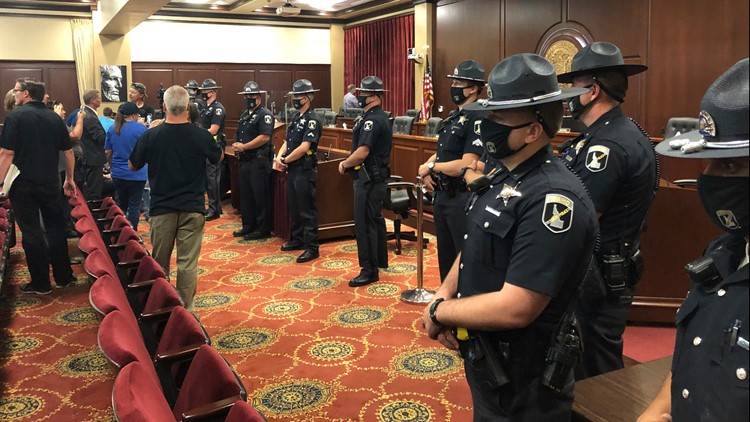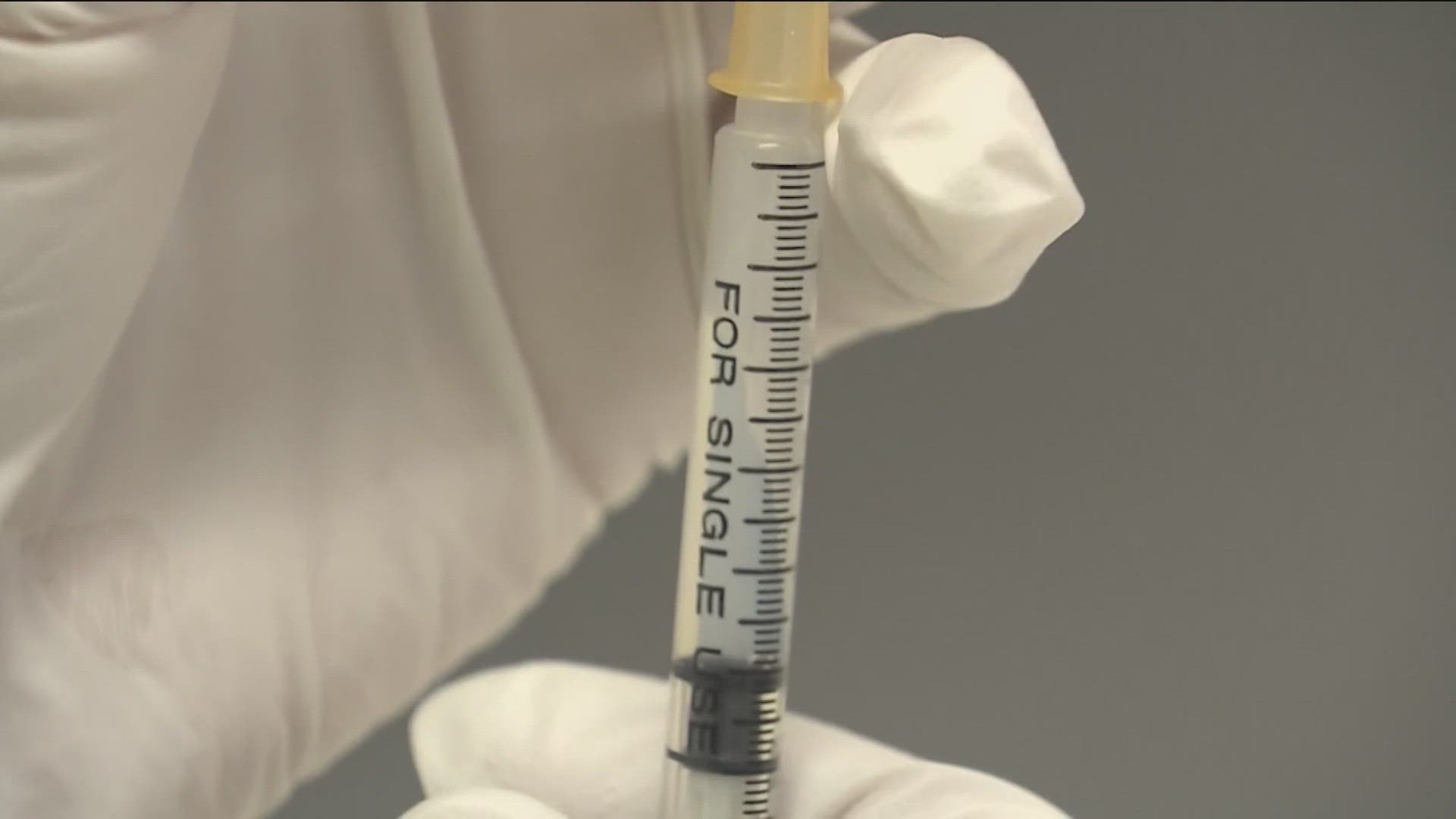BOISE, Idaho — The recent three-day special session of the Idaho Legislature ran up $78,600 in costs for the Idaho State Police alone, with more bills still pending from the Boise Police Department, reports the Idaho Press.
“It was about $26,000 a day for the three days,” said Alex Adams, Gov. Brad Little’s budget director and the chair of Little’s Coronavirus Financial Advisory Committee, which voted unanimously Thursday to pay the bill from federal CARES Act funds. “That was just the state police costs,” he noted. “There’ll be additional costs to the Boise Police Department we’ll take up next week.”
The special session, held during the coronavirus pandemic, drew COVID-doubting, maskless protesters who shoved their way past ISP troopers and broke a glass door leading to the House gallery before filling the gallery in disregard of social distancing rules on the session’s first day. The next two days saw multiple arrests for trespassing or resisting or obstructing officers, including of Ammon Bundy of Emmett, who was arrested twice and barred from the state Capitol for a year.
Rep. Melissa Wintrow, D-Boise, who made the motion to cover the ISP costs, said, “I think it was a costly session in more than one way. But financially, that’s a lot of money.”
Wintrow, who serves on the Legislature’s joint budget committee, said, “When we do the ISP budget, we didn’t budget in $78,000 for a special session. I think no one would have allocated that. … I had never experienced anything like that. I don’t think I’ve ever felt unsafe doing my job.”
She also said she thought the Legislature’s own budget really should’ve been tapped rather than the CARES Act funds.
“I think somebody has to take responsibility for the disarray and the disorder that it cost taxpayers to fund that session,” she said.
CFAC, which includes legislators along with representatives of state and local government, tribes and businesses, considers requests to spend money from Idaho’s $1.25 billion state share of CARES Act funds. Major expenditures thus far have included grants to small businesses impacted by the pandemic; technology expenditures for government and schools; COVID-19 testing; personal protective equipment; first responder costs and more.
In addition to the ISP costs, CFAC on Thursday approved several other major expenditures, including:
- Transferring $200 million in CARES Act funds to Idaho’s unemployment trust fund, boosting its balance before a Sept. 30 deadline and heading off what otherwise would have been an automatic unemployment insurance tax increase for employers that could have run $300 per employee. Gov. Brad Little, who immediately approved the transfer, said it “helps keep jobs and continues our strong economic rebound.” Of the $200 million, $190 million was left over from a small business grant program that distributed about $75 million in $10,000 grants to Idaho businesses impacted by the pandemic.
- Tapping up to $15 million in CARES Act funds to extend the Trump administration’s “Lost Wages Assistance” program, which provides an extra $300 per week in unemployment benefits, to unemployed Idahoans whose regular unemployment benefit is less than $100 per week. They otherwise wouldn’t have qualified; Idaho’s minimum regular unemployment benefit is just $72 per week, and according to the Idaho Department of Labor, about 1,000 unemployed Idahoans currently fall into that group. Idaho Lt. Gov. Janice McGeachin cast the only vote against that expenditure, telling CFAC she believes additional unemployment provides a disincentive to workers to get back on the job. The $300-per-week program from the Trump Administration replaced an earlier $600-per-week pandemic unemployment supplement that expired at the end of July. Initially, President Donald Trump called on states to match the $300 with $100 in state funds, but then the administration agreed to count regular unemployment benefits of at least $100 per week as the state match.
- Allocating $250,000 in CARES Act funds for domestic violence programs across the state that have reported a surge in need. The funds were requested by the Council on Domestic Violence and Victim Assistance, which will pass it out through grants to victim services agencies including child advocacy agencies, domestic violence shelters, and tribal programs providing domestic violence services.
CFAC also voted unanimously against allocating additional CARES Act funds to counties for extra pay for poll workers, as suggested by a non-binding House resolution passed during the special session, instead opting to encourage counties to spend a portion of the local government allocation they’ve already received from CFAC for that or other election-related needs in their counties. Very little of the money in those county shares has been spent thus far.
Adams said for any counties that find they’ve used up their shares and need more for elections, “We’re certainly willing to entertain those on a case-by-case basis.”
CFAC also discussed new U.S. Treasury guidance issued Wednesday night that would allow CARES Act funds from states’ shares to be spent for COVID-19-related education expenses including technology and personal protective equipment, with up to $500 per student presumed to qualify as COVID-related.
“We’re going to have to spend some time with our attorneys to sort through what that means and what that would look like for our schools,” Adams said.
In Idaho, $500 per public school student would come to $150 million or more.
Idaho still has about $350 million left unallocated from its $1.25 billion. The state has discussed using any remaining unallocated funds at the end of the year to shore up its unemployment trust fund, but the transfer to the fund that was approved Thursday hardly cuts into that balance, since it tapped the leftovers from the small business grant program.
Adams said CFAC will research its options on the education guidance and likely meet again next week.
If you enjoy reading articles like this one from our partners at the Idaho Press, please consider subscribing to them for newspaper delivery or digital access to help ensure stories like this are told.
More from our partners at the Idaho Press: Designated ride-hail areas coming to Boise Airport
At KTVB, we’re focusing our news coverage on the facts and not the fear around the virus. To see our full coverage, visit our coronavirus section, here: www.ktvb.com/coronavirus.
Facts not fear: More on coronavirus
See our latest updates in our YouTube playlist:



